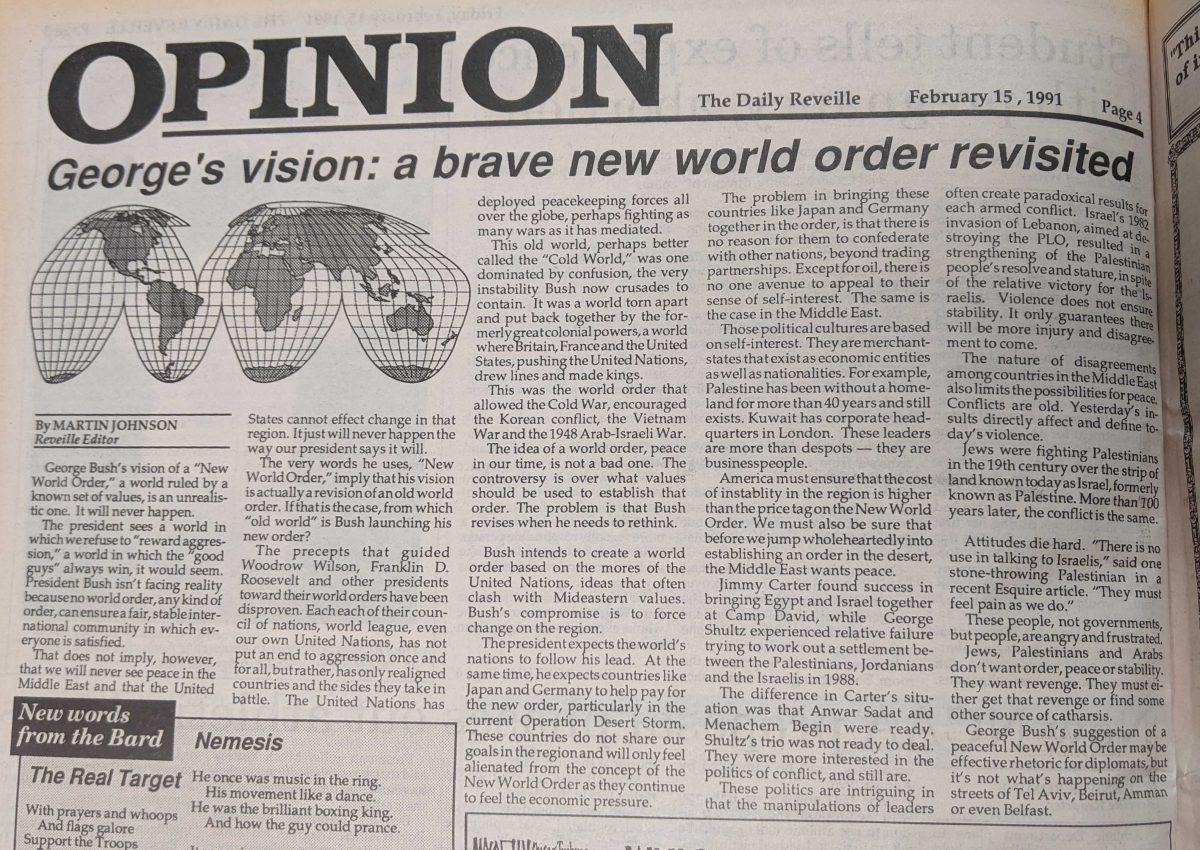George Bush’s vision of a “New World Order,” a world ruled by a known set of values, is an unrealistic one. It will never happen.
The president sees a world in which we refuse to “reward aggression,” a world in which the “good guys” always win, it would seem. President Bush isn’t facing reality because no world order, any kind of order, can ensure a fair, stable international community in which everyone is satisfied.
That does not imply, however, that we will never see peace in the Middle East and that the United States cannot effect change in that region. It just will never happen the way our president says it will.
The very words he uses, “New World Order,” imply that his vision is actually a revision of an old world order. If that’s the case, from which “old world” is Bush launching his new order?
The precepts that guided Woodrow Wilson, Franklin D. Roosevelt and other presdients twoard their world orders have been disproven. Each of their council of nations, world league, even our own United Nations, has not put an end to aggression once and for all, but rather, has only realigned countes and the sides they take in battle. The United Nations has deployed peacekeeping forces all over the globe, perfaps fighting as many wars as it has meditated.
This old world, perhaps better called the “Cold World,” was one dominated by confusion, the very instability Bush now crusades to contain. It was a world torn apart and put back together by the formerly great colonial powers, a world where Britain, France and the United States, pushing the United Nations, drew lines and made kings.
This was the world order that allowed the Cold War, encouraged the Korean conflict, the Vietnam War and the 1948 Arab-Israeli War.
The idea of a world order, peace in our time, is not a bad one. The controversy is over what values should be used to establish that order. The problem is that Bush revises when he needs to rethink.
Bush intends to create a world order based on the mores of the United Nations, ideas that often clash with Mideastern values. Bush’s compromise is to force change on the region.
The president expects the world’s nations to follow his lead. At the same time, he expects countries like Japan and Germany to help pay for the new order, particularly in the current Operation Desert Storm. These countries do not share our goals in the region and will only feel alienated from the concept of the New World Order as they continue to feel the economic pressure.
The problem in bringing these counties like Japan and Germany together in the order, is that there is no reason for them to confederate with other nations, beyond trading partnerships. Except for oil, there is no one avenue to appeal to their sense of self-interest. The same is the case in the Middle East.
Those political cultures are based on self-interest. They are merchant-states that exist as economic entities as well as nationalities. For example, Palestine has been without a homeland for more than 40 years and still exists. Kuwait has corporate headquarters in London. These leaders are more than despots – they are businesspeople.
America must ensure that the cost of instability in the region is higher than the price tag on the New World Order. We must also be sure that before we jump wholeheartedly into establishing an order the desert, the Middle East wants peace.
Jimmy Carter found success in bringing Egypt and Israel together at Camp David, while George Shultz experienced relative failure trying to work out a settlement between the Palestinians, Jordanians and the Israelis in 1988.
The difference in Carter’s situation was that Anwar Sadat and Menachem Begin were ready. Shultz’s trio was not ready to deal. They were more interested in the politics of conflict, and still are.
These politics are intriguing in that the manipulations of leaders often create paradoxical results for each armed conflict. Israel’s 1982 invasion of Lebanon, aimed at destroying the PLO, results in a strengthening of the Palestinian people’s resolve and stature, in spite of the relative victory for the Israelis. Violence does not ensure stability. It only guarantees there will be more injury and disagreement to come.
The nature of disagreements among counties in the Middle East also limits the possibilities for peace. Conflicts are old. Yesterday’s insults directly affect and define tomorrow’s violence.
Jews were fighting Palestinians in the 19th century over the trip of land known today as Israel, formerly known as Palestine. More than 100 years later, the conflict is the same.
Attitudes die hard. “there is no use in talking to Israelis,” said one stone-throwing Palestinian in a recent Esquire article. “They must feel pain as we do.”
These people, not governments, but people, are angry and frustrated.
Jews, Palestinians and Arabs don’t want order, peace or stability. They want revenge. They must either get that revenge or find some other source of catharsis.
George Bush’s suggestion of a peaceful New World Order may be effective rhetoric for diplomats, but it’s not what’s happening on the streets of Tel Aviv, Beirut, Amman or even Belfast.
This 1991 article has been digitized by The Reveille’s Digital Staff in honor of Dean Martin Johnson, who graduated from the Manship School of Mass Communication in 1991 and was an editor for The Reveille during his time at LSU.






